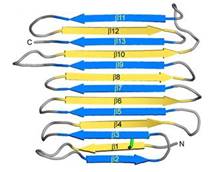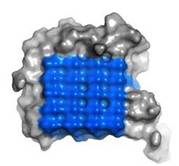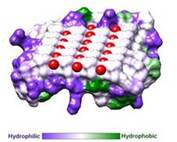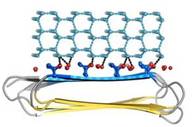We apologize for Proteopedia being slow to respond. For the past two years, a new implementation of Proteopedia has been being built. Soon, it will replace this 18-year old system. All existing content will be moved to the new system at a date that will be announced here.
RiAFP
From Proteopedia
(Difference between revisions)
| Line 1: | Line 1: | ||
<StructureSection load='4dt5' size='340' side='right' caption='Insect antifreeze protein (PDB code [[4dt5]]).' scene='60/607864/Riafp_rocket/2'> | <StructureSection load='4dt5' size='340' side='right' caption='Insect antifreeze protein (PDB code [[4dt5]]).' scene='60/607864/Riafp_rocket/2'> | ||
| - | Antifreeze proteins (AFPs) evolved in various organisms permitting their survival in subzero environments<ref>PMID: 11852248</ref>. They exhibit remarkable structural diversity and molar activities across the various kingdoms<ref>DOI 10.5772/54992</ref>. The longhorn beetle, Rhagium inquisitor, has the ability to supercool to below -25 °C partially due to the presence of a highly potent AFP (RiAFP) in its hemolymph. RiAFP is a 13-kDa protein with one of the highest antifreeze activities measured for any AFP. | + | Antifreeze proteins (AFPs) evolved in various organisms permitting their survival in subzero environments<ref>PMID: 11852248</ref>. They exhibit remarkable structural diversity and molar activities across the various kingdoms<ref>DOI 10.5772/54992</ref>. The longhorn beetle, Rhagium inquisitor, has the ability to supercool to below -25 °C partially due to the presence of a highly potent AFP (RiAFP) in its hemolymph. <scene name='60/607864/Chain_a_without_histag/1'>RiAFP</scene> is a 13-kDa protein with one of the highest antifreeze activities measured for any AFP. |
== Function == | == Function == | ||
| Line 26: | Line 26: | ||
<scene name='60/607864/Riafp/1'>crystallographic structure</scene> | <scene name='60/607864/Riafp/1'>crystallographic structure</scene> | ||
| - | + | ||
<scene name='60/607864/Isosurface_no/1'>TextToBeDisplayed</scene> | <scene name='60/607864/Isosurface_no/1'>TextToBeDisplayed</scene> | ||
Revision as of 08:55, 25 January 2015
| |||||||||||
3D structures of antifreeze protein
References
- ↑ Jia Z, Davies PL. Antifreeze proteins: an unusual receptor-ligand interaction. Trends Biochem Sci. 2002 Feb;27(2):101-6. PMID:11852248
- ↑ Chantelle J. Capicciotti, Malay Doshi and Robert N. Ben (2013). Ice Recrystallization Inhibitors: From Biological Antifreezes to Small Molecules, Recent Developments in the Study of Recrystallization, Prof. Peter Wilson (Ed.), ISBN: 978-953-51-0962-4, InTech doi:http://dx.doi.org/10.5772/54992
- ↑ Drori R, Celik Y, Davies PL, Braslavsky I. Ice-binding proteins that accumulate on different ice crystal planes produce distinct thermal hysteresis dynamics. J R Soc Interface. 2014 Sep 6;11(98):20140526. doi: 10.1098/rsif.2014.0526. PMID:25008081 doi:http://dx.doi.org/10.1098/rsif.2014.0526
- ↑ doi: https://dx.doi.org/10.1016/S0006-3495(91)82234-2
- ↑ Hakim A, Nguyen JB, Basu K, Zhu DF, Thakral D, Davies PL, Isaacs FJ, Modis Y, Meng W. Crystal structure of an insect antifreeze protein and its implications for ice binding. J Biol Chem. 2013 Apr 26;288(17):12295-304. doi: 10.1074/jbc.M113.450973. Epub, 2013 Mar 12. PMID:23486477 doi:10.1074/jbc.M113.450973





